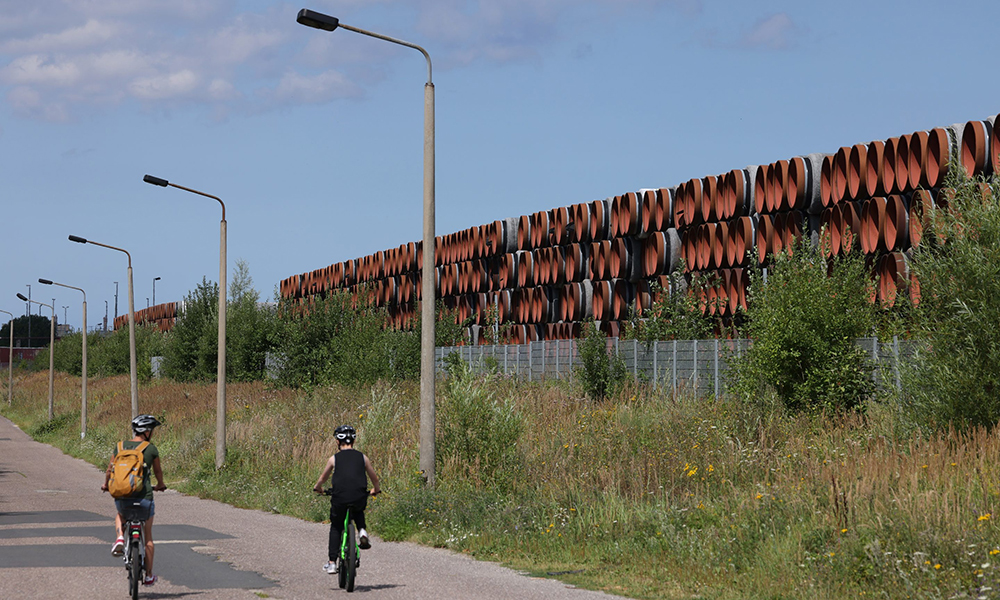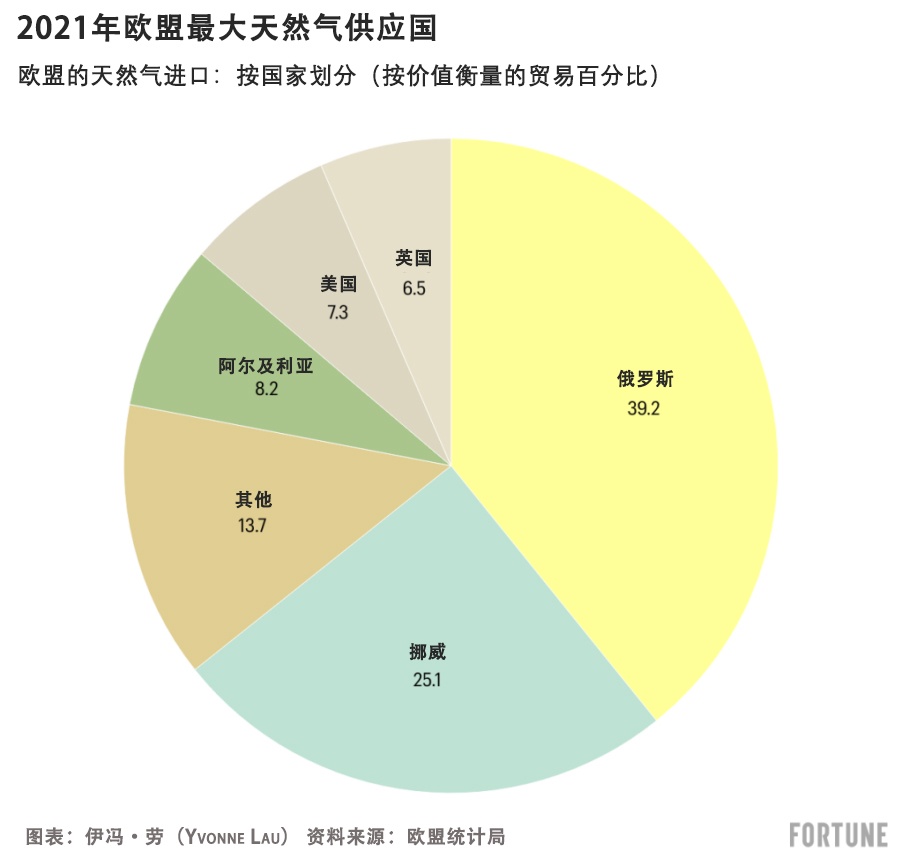
創紀錄的熱浪席卷歐洲,迫使人們打開空調,創紀錄的熱浪還引發野火并造成數百人死亡。國際能源署(International Energy Agency)向歐洲大陸發出嚴厲警告:立即削減天然氣需求,否則將面臨“漫長而艱難的冬天”。
但對歐洲來說,這可能說起來容易做起來難,因為酷熱的天氣迫使人們打開空調,而高溫本身也讓法國和德國等國無法提高核能力和定期獲得燃料供應。
總部設在法國巴黎、負責確保全球能源安全的國際能源署在7月18日的一份報告中警告說,由于人們越來越擔心俄羅斯完全切斷對歐洲大陸的天然氣供應,歐洲能源危機變得“異常危險”。
“隨著冬天臨近,我們對俄羅斯下一步可能采取的行動有了更清晰的認識。接下來的幾個月將是至關重要的。我一直敦促[歐洲領導人]現在盡其所能,為漫長而艱難的冬天做準備。”國際能源署的執行干事法提赫·比羅爾在7月18日表示。
今年6月,俄羅斯最大的國有能源公司俄羅斯天然氣工業股份公司(Gazprom)對歐洲的天然氣供應減少了60%,理由是將俄羅斯天然氣通過波羅的海的海底輸送到德國的北溪1號 (Nord Stream 1)天然氣管道需要進行維修。另一方面,歐盟委員會(European Commission)稱,俄羅斯天然氣工業股份公司的舉動是俄羅斯政府的“勒索手段”,目的是考驗即便面臨無法為經濟提供動力和實現家庭供暖的威脅,歐洲是否會因為俄烏沖突而堅持對俄羅斯實施制裁。
即使在努力為家庭實現降溫、撲滅野火,并應對潛在的電力中斷和因為高溫而導致的火車軌道扭曲時,歐洲各國目前正忙著在冬季能源需求激增之前填充儲氣罐,歐盟的天然氣儲氣庫目前已滿64%。國際能源署警告稱,即使歐盟的天然氣儲存水平達到90%,一旦俄羅斯大規模切斷天然氣供應,各國仍將面臨更高的天然氣供應中斷風險。
俄羅斯的天然氣供應占歐洲約40%的天然氣進口供應。去年,俄羅斯向歐洲大陸輸送了1550億立方米的天然氣。

國際能源署表示,歐洲必須在未來幾個月大幅削減天然氣需求,以應對冬季的能源需求。
比羅爾說:“現在采取措施為過冬做準備要好得多,而不是讓數百萬人的福祉和歐洲經濟受天氣的擺布,或者……給[俄羅斯]總統弗拉基米爾·普京額外的籌碼。”
行動計劃
國際能源署寫道:“需要立即采取的第一步”是大幅減少當前的天然氣需求——從企業到家庭——以確保在冬季之前有足夠的天然氣儲存水平。據該機構稱,在接下來的三個月里,歐盟國家需要額外節省120億立方米的天然氣——足以填滿130艘液化天然氣(LNG)油輪。
為了避免嚴重的供應中斷,歐盟已經采取行動確保替代能源供應國能夠保證供應。7月18日,歐盟與阿塞拜疆簽署了一項新協議,到2027年,阿塞拜疆每年至少供應200億立方米天然氣。但國際能源署警告稱,依靠來自俄羅斯以外國家的天然氣供應是不夠的,因為這些供應根本無法填補由于俄羅斯停止供應而出現的巨大缺口。即使阿塞拜疆和挪威等國的天然氣達到最大供應量,如果俄羅斯完全切斷天然氣供應,歐盟就仍然面臨供應中斷的巨大風險。
根據國際能源署,在可行的情況下,歐盟應該暫時加大使用煤炭和燃油發電,以及風能、太陽能甚至核能等可再生能源;并引入拍賣平臺,允許工業天然氣用戶提供供應,以減少天然氣需求。
德國經濟和氣候行動部的部長羅伯特·哈貝克當時表示,德國政府在今年6月做出了“痛苦……但十分必要”的決定,重新啟用關閉的燃煤電廠以降低該國的天然氣需求。該國的目標是在本十年末逐步淘汰煤炭發電。
歐盟各國還必須推進活動,鼓勵家庭減少用電量,并制定夏季制冷標準和控制措施。
7月20日,歐盟委員會宣布各國將采取的額外緊急措施,以遏制天然氣需求。
國際能源署寫道:今年冬天可能會成為“對歐洲團結的歷史性考驗——不能失敗——其影響遠遠超出能源領域”。(財富中文網)
譯者:中慧言-王芳
創紀錄的熱浪席卷歐洲,迫使人們打開空調,創紀錄的熱浪還引發野火并造成數百人死亡。國際能源署(International Energy Agency)向歐洲大陸發出嚴厲警告:立即削減天然氣需求,否則將面臨“漫長而艱難的冬天”。
但對歐洲來說,這可能說起來容易做起來難,因為酷熱的天氣迫使人們打開空調,而高溫本身也讓法國和德國等國無法提高核能力和定期獲得燃料供應。
總部設在法國巴黎、負責確保全球能源安全的國際能源署在7月18日的一份報告中警告說,由于人們越來越擔心俄羅斯完全切斷對歐洲大陸的天然氣供應,歐洲能源危機變得“異常危險”。
“隨著冬天臨近,我們對俄羅斯下一步可能采取的行動有了更清晰的認識。接下來的幾個月將是至關重要的。我一直敦促[歐洲領導人]現在盡其所能,為漫長而艱難的冬天做準備。”國際能源署的執行干事法提赫·比羅爾在7月18日表示。
今年6月,俄羅斯最大的國有能源公司俄羅斯天然氣工業股份公司(Gazprom)對歐洲的天然氣供應減少了60%,理由是將俄羅斯天然氣通過波羅的海的海底輸送到德國的北溪1號 (Nord Stream 1)天然氣管道需要進行維修。另一方面,歐盟委員會(European Commission)稱,俄羅斯天然氣工業股份公司的舉動是俄羅斯政府的“勒索手段”,目的是考驗即便面臨無法為經濟提供動力和實現家庭供暖的威脅,歐洲是否會因為俄烏沖突而堅持對俄羅斯實施制裁。
即使在努力為家庭實現降溫、撲滅野火,并應對潛在的電力中斷和因為高溫而導致的火車軌道扭曲時,歐洲各國目前正忙著在冬季能源需求激增之前填充儲氣罐,歐盟的天然氣儲氣庫目前已滿64%。國際能源署警告稱,即使歐盟的天然氣儲存水平達到90%,一旦俄羅斯大規模切斷天然氣供應,各國仍將面臨更高的天然氣供應中斷風險。
俄羅斯的天然氣供應占歐洲約40%的天然氣進口供應。去年,俄羅斯向歐洲大陸輸送了1550億立方米的天然氣。
國際能源署表示,歐洲必須在未來幾個月大幅削減天然氣需求,以應對冬季的能源需求。
比羅爾說:“現在采取措施為過冬做準備要好得多,而不是讓數百萬人的福祉和歐洲經濟受天氣的擺布,或者……給[俄羅斯]總統弗拉基米爾·普京額外的籌碼。”
行動計劃
國際能源署寫道:“需要立即采取的第一步”是大幅減少當前的天然氣需求——從企業到家庭——以確保在冬季之前有足夠的天然氣儲存水平。據該機構稱,在接下來的三個月里,歐盟國家需要額外節省120億立方米的天然氣——足以填滿130艘液化天然氣(LNG)油輪。
為了避免嚴重的供應中斷,歐盟已經采取行動確保替代能源供應國能夠保證供應。7月18日,歐盟與阿塞拜疆簽署了一項新協議,到2027年,阿塞拜疆每年至少供應200億立方米天然氣。但國際能源署警告稱,依靠來自俄羅斯以外國家的天然氣供應是不夠的,因為這些供應根本無法填補由于俄羅斯停止供應而出現的巨大缺口。即使阿塞拜疆和挪威等國的天然氣達到最大供應量,如果俄羅斯完全切斷天然氣供應,歐盟就仍然面臨供應中斷的巨大風險。
根據國際能源署,在可行的情況下,歐盟應該暫時加大使用煤炭和燃油發電,以及風能、太陽能甚至核能等可再生能源;并引入拍賣平臺,允許工業天然氣用戶提供供應,以減少天然氣需求。
德國經濟和氣候行動部的部長羅伯特·哈貝克當時表示,德國政府在今年6月做出了“痛苦……但十分必要”的決定,重新啟用關閉的燃煤電廠以降低該國的天然氣需求。該國的目標是在本十年末逐步淘汰煤炭發電。
歐盟各國還必須推進活動,鼓勵家庭減少用電量,并制定夏季制冷標準和控制措施。
7月20日,歐盟委員會宣布各國將采取的額外緊急措施,以遏制天然氣需求。
國際能源署寫道:今年冬天可能會成為“對歐洲團結的歷史性考驗——不能失敗——其影響遠遠超出能源領域”。(財富中文網)
譯者:中慧言-王芳
As record heatwaves scorch Europe, forcing people to turn up their air conditioning, triggering wildfires and killing hundreds, the International Energy Agency (IEA) has a stark warning for the continent: cut gas consumption immediately or face a "long, hard winter" ahead.
But that might be easier said than done for Europe as blistering temperatures are forcing people to crank up their air conditioners, and the heat itself has hurt the ability of countries like France and Germany to increase their nuclear capacity and to get their regular fuel deliveries.
In a July 18 report, the IEA—a Paris-based body that's charged with ensuring global energy security—warned that the global energy crisis is becoming "especially perilous" in Europe as fears mount over a complete cut-off of Russian gas supply to the continent.
“As we get closer to next winter, we are getting a clearer sense of what Russia may do next. The next few months will be critical. I have been urging [European leaders] to do all they can right now to prepare for a long, hard winter,” Fatih Birol, the IEA’s executive director, said on July18.
Gazprom, a Russian state-owned energy firm and the country's largest, curtailed gas supplies to Europe by 60% last month, citing repairs to the Nord Stream 1 pipeline that transports Russian gas to Germany beneath the Baltic Sea. The European Commission, on the other hand, described Gazprom's moves as an "instrument of blackmail" by the Kremlin to test whether Europe would stick to its sanctions against Russia over its war with Ukraine, even if it was threatened with the prospect of being unable to power its economy and heat its homes.
European nations are now scrambling to fill their gas storage tanks before winter's intense energy demands set in, even while they try to cool households, extinguish wildfires and deal with potential power disruptions and warped train tracks due to the heat. EU’s gas storage sites are currently 64% full. Even if the EU's gas storage levels reach 90%, countries still face a heightened risk for gas supply disruptions in the event of a wholesale Russian cut-off, the IEA warns.
Russia supplies around 40% of Europe's natural gas. Last year, the country delivered 155 billion cubic meters of gas to the continent.
The IEA says Europe must dramatically slash its gas intake over the next few months, to prepare for winter's energy demands.
“It’s much better to take steps now to prepare for winter, than to leave the well-being of millions of people and European economies [to] the mercy of the weather or... give extra leverage to [Russian] President Vladimir Putin," Birol said.
Action plan
The "first, immediate step" is to significantly reduce Europe's current gas consumption—from both businesses and households—to ensure adequate gas storage levels before winter, the IEA wrote. EU nations need to save an additional 12 billion cubic meters of gas—enough to fill 130 liquified natural gas (LNG) tankers—over the next three months, according to the agency.
To avoid a significant supply disruption, the EU has moved to secure alternative energy suppliers. On July 18, the EU inked a new deal with Azerbaijan for at least 20 billion cubic meters of gas per year by 2027. But the IEA cautions that it's not enough to rely on non-Russian sources of gas as these suppliers are "not available in the volumes required" to replace Russia's missing deliveries. Even if gas supplies from countries like Azerbaijan and Norway flow to Europe at maximum capacity, the EU still faces a substantial risk of supply interruptions if Russia cuts off its gas completely.
The EU should temporarily increase the use of coal and oil-fired power generation, and renewable sources like wind, solar and even nuclear power, where feasible; and introducing auction platforms that allow industrial gas users to offer their supply in order to reduce gas consumption, according to the IEA.
In June, the German government made the "bitter... but simply necessary" decision to reopen shuttered coal plants to lower the country's gas usage, Germany's economy and climate action minister Robert Habeck said at the time. The country was aiming to phase out coal power generation by the end of this decade.
EU countries also must advance campaigns to encourage households to reduce electricity consumption, and set cooling standards and controls during the summer.
On July 20, the European Commission announced additional urgent measures that countries will implement to curb gas consumption.
This winter could become a "historic test of European solidarity—one it cannot afford to fail—with implications far beyond the energy sector," the IEA wrote.






